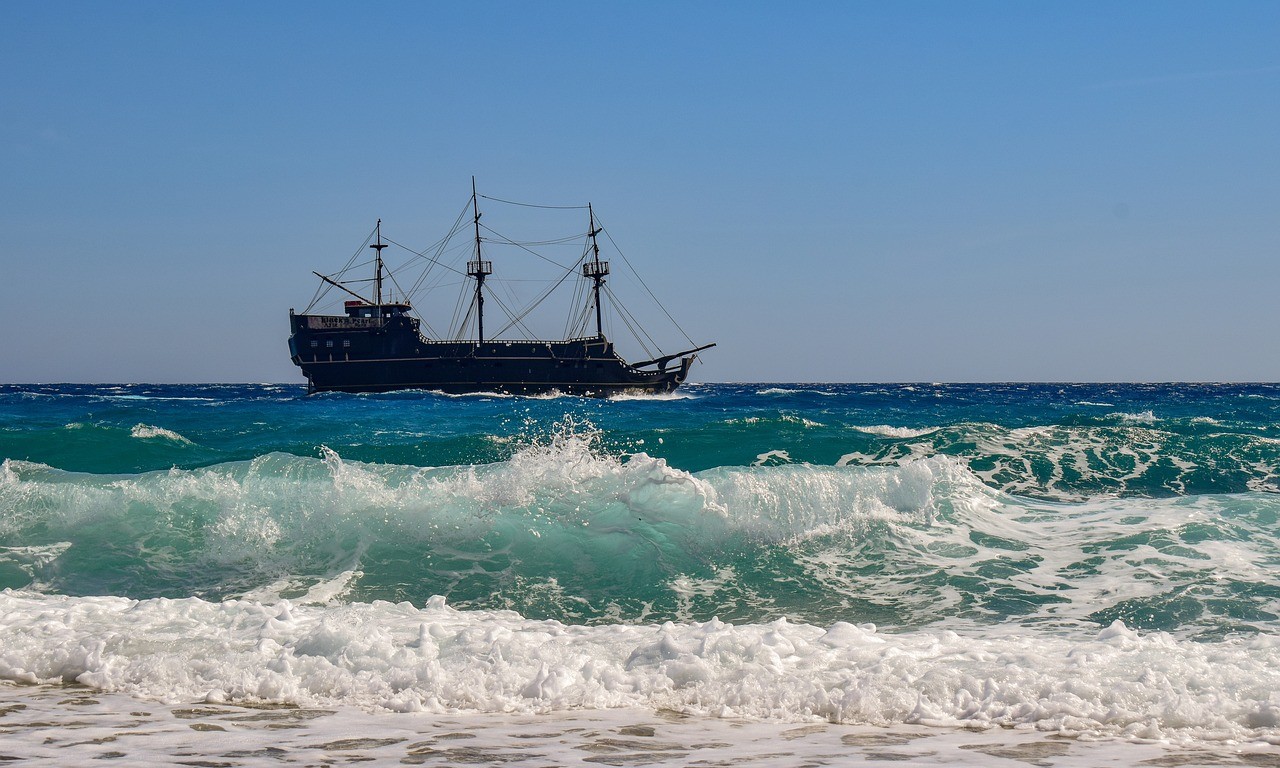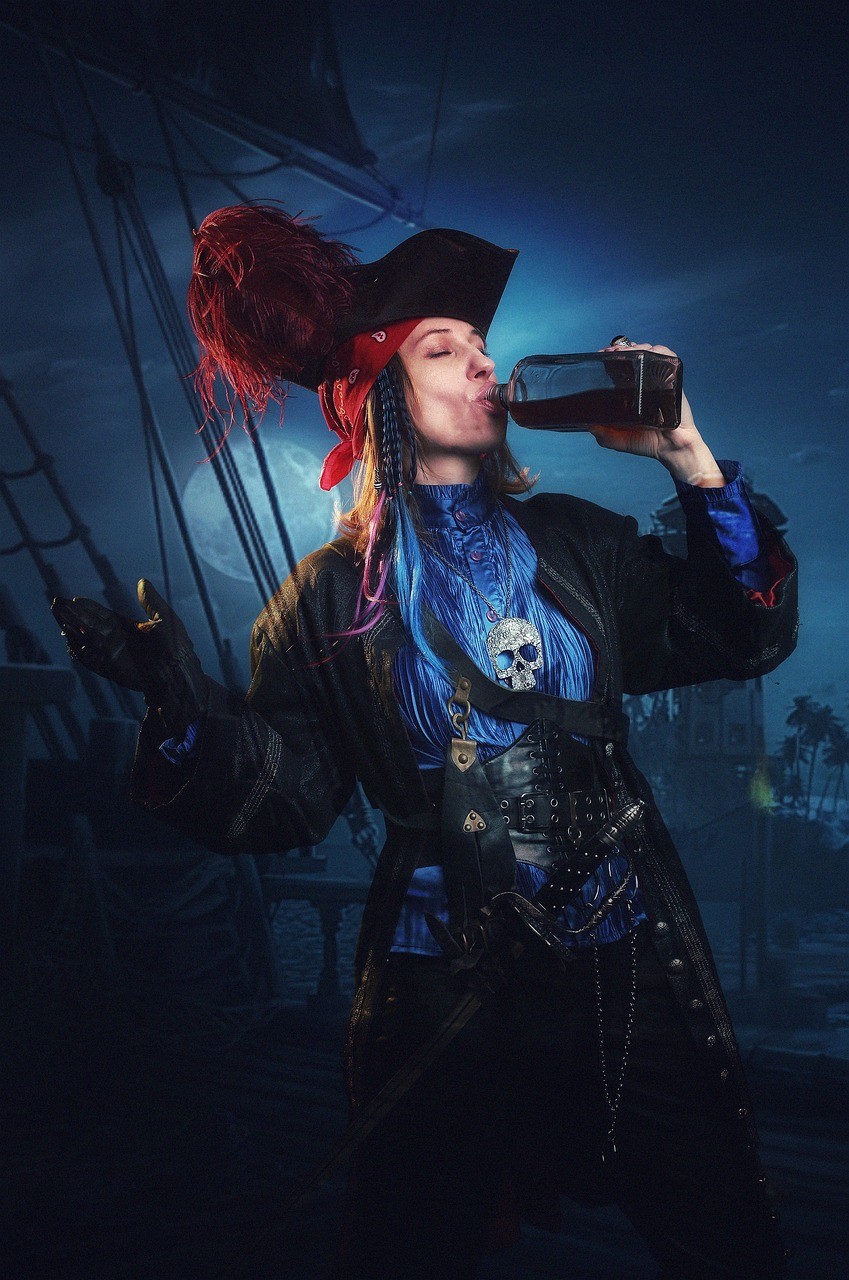Be a Pirate!
Have you ever heard of women who became pirates?
Traditionally, the history of piracy has focused on the legendary marauders active in Europe and the Americas between the 16th and 18th centuries. In reality, pirates operated in all times and seas, from the British Isles to Southeast Asia, from the Mediterranean to Scandinavia, from the Caribbean to the Southern Hemisphere. Among these shady as well as fascinating figures, there were not only rough and bearded hulks but also women and maidens who left land and chose the sea as a space and instrument of emancipation and individual fulfillment, thus saving themselves from a subordinate, often miserable or, simply, boring life.
Rebellious, fearless and unscrupulous, they forced their fate and did not hesitate to resort to strategy, violence and war to become the protagonists of their existence. For personal freedom or that of their country, for thirst for revenge or power, for the love of a man or for the sheer pleasure of adventure, pirate women disobeyed, defied the laws of men and fought until the end of their days. Sometimes winning, sometimes even losing their lives but never giving up their deep nature and their dreams of independence.Whether queens, peasants, galley slaves or prostitutes, those strong, daring and revolutionary women deserve to have their lives rescued from the silence of oblivion in which they have remained for centuries, and for their stories to be, at last, told.
Why the Swiss are Smarter
Uncovering and narrating so many epic adventures is Italian journalist Rosaria Guerra; already appreciated by Swiss readers for having authored with Jacopo Fo the provocative essay “Why the Swiss are smarter” (Barbera Ed.), and for having conceived and edited for RSI Radiotelevisione Svizzera the blog Sweet…zerland in which, armed with pen and pencil, she traced, with verve and irony “the portrait in the mirror of the two beloved peoples, with their little vices, great virtues and amusing foibles.”
In her new essay PIRATE WOMEN. Rebellious Lives on the Sea Rosaria Guerra recounts, through an extensive and in-depth analysis of sources, many unpublished and compelling stories of emancipation and personal fulfillment: more than thirty female pirates, privateers, ship-owners, captains, and vessel commanders; women from different countries and social classes, between reality, myth and legend, courageous figures with irrepressible strength, who defied the laws of patriarchal society in pursuit of Freedom, leaving a mark in the history of their time.
A Hymn to Freedom
The author’s intent is to raise from oblivion truly existed yet neglected female characters from official historiography through an exciting excursus from the 6th century B.C. to the present day, so that those long-forgotten outlaw women can re-emerge from the depths of memory to make their voices heard, and reclaim their rightful place among the pages of History.
The lives and choices of these extraordinary women show us how reductive it is still today to speak of “manly” trades and actions, and teach us that strength knows no gender because that what counts, in every time and place, is attitude, passion, courage and, last but not least, opportunity.
Their deeds are a hymn, a song of freedom calling all women to rise up against the invisible chains that still threaten, to this day, their independence and dignity. In each of them burns a rebellious and tenacious spirit that invites all of us to overcome discrimination and boundaries: the ardent quest for freedom in them is a beacon that illuminates the course, a constellation ready to guide us toward a future in which men and women can finally sail together, sharing the helm of life, defying stereotypes and horizons, never wanting to excel one another.
A Canadian Story
Among the indomitable captains who plied the salty waters of seas and oceans was a “freshwater” pirate, a legendary figure who sailed up the rivers and lakes of Canada in the late 1800s and early 1900s.
At the time, the inhabitants of Canadian British Columbia could rely on few passable roads, and rivers and railroads were the main routes of communication. Dozens of boats crossed the often treacherous waterways to transport passengers and precious metals, and to supply towns with goods from the ocean, contributing to the mining development of those wilderness regions where many ventured into a wild gold rush.
Gunpowder Gertie became a pirate out of revenge, and with a motor boat stolen from the Canadian police, she carried out daring acts of piracy to the detriment of all boats he passed. In defiance of the authorities, in the years 1898 to 1903 the outlaw plowed rivers and lakes aboard her gunboat, attacking and plundering vessels of their cargoes with impunity: gold and silver from local mines and wages for city workers. The pirate would appear out of nowhere and storm off, only to vanish again into the billows. In those years, no matter how hard she tried, the police could never catch her; she seemed to become elusive.
A Surprising End
How did it turn out? If you want to find out how Gertie ended her days, and learn about the adventures of the other daring protagonists, all you have to do is dive into the pages of this fine book and let the waves of the tale carry you away.
By the way, did you know that the gentle, cool waters of the tranquil Swiss lakes were also once traversed by terrible pirates? But that’s another story….
In bookstores and major online stores, in print and ebook versions:
Donne Pirata – Vite Ribelli sul Mare
Avete mai sentito parlare di donne che si fecero pirata?
Tradizionalmente, la storia della pirateria è incentrata sui leggendari predoni attivi in Europa e nelle Americhe tra il XVI e il XVIII secolo. In realtà, pirati e corsari operarono in ogni tempo e in ogni mare, dalle isole britanniche al sud est asiatico, dal Mediterraneo alla Scandinavia, dai Caraibi all’emisfero australe.
Tra questi loschi quanto affascinanti figuri, non vi furono solo omaccioni rozzi e barbuti ma anche donne e fanciulle che lasciarono la terraferma e scelsero il mare come spazio e strumento di emancipazione e di realizzazione individuale, salvandosi così da una vita subordinata, spesso misera o, semplicemente, noiosa.
Ribelli, impavide e spregiudicate, forzarono il loro destino e non esitarono a ricorrere alla strategia, alla violenza e alla guerra per diventare protagoniste della loro esistenza. Per la libertà personale o del loro Paese, per sete di vendetta o di potere, per amore di un uomo o per puro piacere dell’avventura, le donne pirata disubbidirono, sfidarono le leggi degli uomini e combatterono fino alla fine dei loro giorni. Talvolta vincendo, talvolta perdendo persino la vita ma senza mai rinunciare alla loro natura profonda e ai loro sogni di indipendenza.
Regine, contadine, galeotte o prostitute, quelle donne forti, audaci e rivoluzionarie meritano che le loro vite siano sottratte al silenzio dell’oblio in cui sono rimaste per secoli, e che le loro storie siano, finalmente, raccontate.
Perchè gli Svizzeri Sono più Intelligenti
A scoprire e a narrare tante epiche avventure è la giornalista italiana Rosaria Guerra; già apprezzata dai lettori elvetici per aver firmato con Jacopo Fo il provocatorio saggio “Perché gli svizzeri sono più intelligenti” (Barbera Ed.), e per aver ideato e curato per la RSI Radiotelevisione Svizzera il blog Sweet…zerland in cui, armata di penna e matita, tracciava, con verve e ironia “il ritratto allo specchio dei due popoli amati, con i loro piccoli vizi, le grandi virtù e le divertenti manie”.
Nel suo nuovo saggio “DONNE PIRATA. Vite ribelli sul mare” (Youcanprint Ed.) Rosaria Guerra racconta, attraverso un’ampia e approfondita analisi delle fonti, tante storie inedite e coinvolgenti di emancipazione e di realizzazione personale: oltre trenta pirate, corsare, armatrici, capitane, e comandanti di vascello; donne di differenti Paesi e classi sociali, tra realtà, mito e leggenda, figure coraggiose dalla forza irrefrenabile, che sfidarono le leggi della società patriarcale alla ricerca della Libertà, lasciando un segno nella storia del loro tempo.
Inno alla Libertà
L’intento dell’autrice è di risollevare dall’oblio personaggi femminili realmente esistiti eppure trascurati dalla storiografia ufficiale attraverso un appassionante excursus che va dal VI secolo a.C. ai nostri giorni, perché quelle donne fuorilegge a lungo dimenticate possano riemergere dagli abissi della memoria per far udire la propria voce, e reclamare il posto che spetta loro tra le pagine della Storia.
Le vite e le scelte di queste donne straordinarie ci mostrano quanto sia riduttivo parlare ancora oggi di mestieri e azioni “da uomo”, e ci insegnano che la forza non conosce genere perché che ciò che conta, in ogni tempo e in ogni luogo, è l’attitudine, la passione, il coraggio e, non ultima, l’opportunità.
Le loro gesta sono un inno, un canto di libertà che chiama tutte le donne a sollevarsi contro le catene invisibili che ancora minacciano, a tutt’oggi, la loro indipendenza e la loro dignità.
In ognuna di loro arde uno spirito ribelle e tenace che invita tutti noi a superare le discriminazioni e i confini: la ricerca ardente di libertà che c’è in loro è un faro che illumina la rotta, una costellazione pronta a guidarci verso un futuro in cui gli uomini e le donne possano finalmente navigare insieme, condividendo il timone della vita, sfidando gli stereotipi e gli orizzonti, senza voler primeggiare mai gli uni sulle altre.
Tra le indomite capitane che solcarono le acque salate di mari e oceani, vi fu una pirata di “acqua dolce”, figura leggendaria che risalì i fiumi e i laghi del Canada tra il finire dell’ Ottocento e l’inizio del Novecento.
Al tempo, gli abitanti della Columbia Britannica canadese potevano contare su poche strade percorribili e i fiumi e le ferrovie erano le principali vie di comunicazione. Decine di battelli attraversavano i corsi d’acqua, spesso insidiosi, per trasportare i passeggeri e i metalli pregiati, e per rifornire le città di merci provenienti dall’oceano, contribuendo allo sviluppo minerario di quelle regioni selvagge in cui molti si avventuravano in una sfrenata corsa all’oro.
Gunpowder Gertie si fece pirata per vendetta, e con un’imbarcazione a motore rubata alla polizia canadese compì ardite azioni di pirateria a danno di tutti i battelli che incrociava. In barba alle autorità, negli anni dal 1898 al 1903 la fuorilegge solcò fiumi e laghi a bordo della sua cannoniera, attaccando e depredando impunemente i battelli dei loro carichi: oro e argento dalle miniere locali e paghe per i lavoratori delle città. La pirata appariva dal nulla e si lanciava all’arrembaggio, per poi svanire nuovamente tra i flutti. In quegli anni, per quanto ci provasse, la polizia non riuscì mai a catturarla, sembrava diventata inafferrabile.
Una Fine Sorprendente
Come andò a finire? Se volete scoprire come Gertie concluse i suoi giorni, e conoscere le avventure delle altre audaci protagoniste, non vi resta che immergervi tra le pagine di questo bel libro e lasciarvi trasportare dalle onde del racconto.
A proposito, lo sapevate che anche le dolci e fresche acque dei tranquilli laghi svizzeri furono percorse un tempo da terribili pirati? Ma questa è un’altra storia…
In libreria e sui principali store online, in versione cartacea ed ebook:
Donne Pirata. Vite ribelli sul mare













